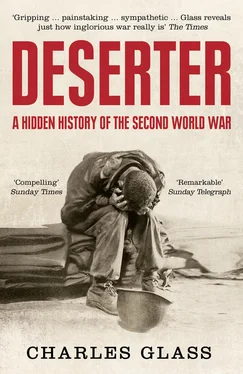Those who showed the greatest sympathy to deserters were other frontline soldiers. They had, at one time or another, felt the temptation to opt out of the war through desertion, shooting themselves in the foot or lagging behind when ordered forward. It was a rare infantryman who attempted to prevent his comrades from leaving the line. The astounding fact is not that so many men deserted but that the deserters were so few.
Eddie Slovik’s identity became public knowledge in 1954, when Huie published his well-researched The Execution of Private Slovik . Twenty years later, the actor Martin Sheen played Slovik in a television film of the same title. Sheen recited the actual words that Slovik himself uttered before his execution: ‘They’re not shooting me for deserting the United States Army, thousands of guys have done that. They just need to make an example out of somebody and I’m it because I’m an ex-con. I used to steal things when I was a kid, and that’s what they are shooting me for. They’re shooting me for the bread and chewing gum I stole when I was 12 years old.’
Eddie Slovik was the first American soldier executed for desertion since a Union Army firing squad shot one William Smitz of Company F, 90th Pennsylvania Volunteers, in 1865. (More than 300,000 troops deserted from the Union and Confederate Armies in the Civil War. Mark Twain famously deserted from both sides.) Slovik was not the only soldier to desert from the American armed forces between 1865 and 1945. Desertion was common in the post-Civil War Army, when many frontier troops had a cavalier attitude towards military service. Badly paid, miserably fed and maltreated by their officers, they had few qualms about drifting away to the gold fields, silver mines and cattle drives where conditions and pay were better. No one was shot for desertion during the wars against North America’s indigenous population or the Spanish-American War. During the First World War, of the twenty-four death sentences imposed for desertion by courts martial, President Woodrow Wilson commuted them all.
If Slovik was the unluckiest deserter in the US Army, Wayne Powers was probably the most fortunate. Private First Class Wayne Powers was a twenty-three-year-old army truck driver when he landed in France three days after D-Day. In November 1944, he met a dark-haired French girl named Yvette Beleuse in the northern French village of Mont d’Origny near the Belgian border. Powers, born in Chillicothe, Missouri, spoke no French, and Yvette did not know English. As the newspaper France Soir wrote later, ‘She gave him a woman’s smile after months of murderous combat.’ When Powers was ferrying supplies to the Belgian border a few days before the Bulge counter-offensive, his truck was hijacked (probably by deserters). Alone, on foot and unable to find his unit, he went back to Yvette. Unable to marry without revealing his existence to the police, Powers hid in the Beleuse family house while Yvette worked in a textile factory nearby. The couple had five children, who were forbidden to tell anyone who their father was. In the meantime, the Second World War had ended. The Korean War came and went. Powers’s commander, General Eisenhower, became President of the United States. All the while, Powers remained a wanted man. American Military Police and French gendarmes raided the house twice without discovering his hiding place under the stairs.
Four years after Huie’s book made Slovik’s case a cause célèbre , Wayne Powers became front-page news. In March 1958, a car crashed outside the Beleuse house and Powers made the mistake of looking through the curtains. Policemen taking details saw him and turned him over to American MPs. When the story of young lovers Wayne and Yvette hit the newspapers, the American Embassy in Paris received 60,000 letters in three days – all demanding clemency for a young American who had fallen in love with a French girl. A court martial found Powers guilty of desertion and sentenced him to ten years at hard labour, but this was quickly reduced to six months. The Judge Advocate General’s office in Washington reviewed his case and released him. Two years later, Powers and Yvette married in Mont d’Origny. By then, their sixth child had been born.
Those who told the stories of Slovik and Powers did not connect them to the wider phenomenon of mass desertion. The vast majority of the 150,000 American and British soldiers who deserted the ranks during the war were unlike both Slovik and Powers. Slovik was the only one shot for his crime, and Powers was one of the few convicted deserters to get off almost scot-free. The real story of Second World War deserters lay elsewhere, and this writer’s most important task was to find soldiers whose fates were more emblematic and less publicized.
A serendipitous encounter in London led me in the right direction. It happened in March 2009, when I was promoting my previous book, Americans in Paris: Life and Death under Nazi Occupation , at the Frontline Club for war correspondents in London. A courtly and well-dressed American gentleman in the audience asked some pertinent questions. He was that person any speaker fears: someone who knows what he’s talking about. It became obvious that his knowledge of the French Resistance was more intimate than mine. A red rosette, discreetly pinned to his lapel, marked him as a member of France’s Legion of Honour. It turned out he had been one of the few American regular soldiers to fight with the Resistance in 1944.
We met for coffee later near his house in South Kensington, where he regaled me with tales of life among the résistants . Eventually, he asked what I was working on next. I told him it was a book on American and British deserters in the Second World War and asked if he knew anything about it. He answered, ‘ I was a deserter.’
We ordered more coffee, and my friendship with Steve Weiss – decorated combat veteran of the US 36th Infantry Division, former résistant and deserter – was born.
Until then, my research had led me from archives to libraries, from court martial records to old V-mail letters, from fading documents to myriad academic studies. Steve Weiss infused the war and the dilemmas facing deserters with fresh vitality. His generosity extended to many hours of interviews, as well as access to his cache of memorabilia that included an unpublished memoir, letters, newspaper articles, photographs and books. We went together to the battlefields where he fought in eastern France and found the moss-grown foxholes that he and others like him had dug in the forests. I pestered him often with questions to which he unfailingly and candidly responded. Although born in 1925, he retained the robust health and enthusiasm of the teenager who volunteered in 1942 to take part in Eisenhower’s crusade.
As I came to know Weiss better, my respect and admiration increased. His life after the war became a long exploration of the effects on him and others of combat, military conformity and prison. Years in therapy led him to become a psychologist, a profession in which his experience provided the empathy to treat those with traumas similar to and often more disabling than his own. Confronting the anguish that other veteran soldiers preferred to leave dormant, Weiss conducted battlefield tours, revisited the scenes of his triumphs and his shame and sought out old comrades-in-arms. Late in life, he moved from California to London to lecture at King’s College’s famed Department of War Studies.
‘It is always an enriching experience to write about the American soldier in adversity no less than in glittering triumph,’ wrote Charles B. MacDonald, an infantry captain in northern Europe in 1944 and 1945, in The Siegfried Line Campaign . The Second World War imposed more than enough adversity on the infantry riflemen who did most of the fighting. The majority of those who landed in the first waves on the Italian and French coastlines to fight long campaigns did not survive to see their triumph, and some who lived were in prison for desertion when they heard the news of Germany’s surrender. Knowing that they would not be rotated out of the line or receive respite from danger, they had chosen disgrace over the grave. For others, there was no choice. Their bodies simply led them away from danger, and they remembered walking away as if in a dream. Many were afraid, many broke down and many just could not take any more. ‘The mystery to me,’ wrote Ernie Pyle, the battlefront correspondent known for his sympathetic reports about ordinary GIs, ‘is that anybody at all, no matter how strong, can keep his spirit from breaking down in battle.’
Читать дальше












